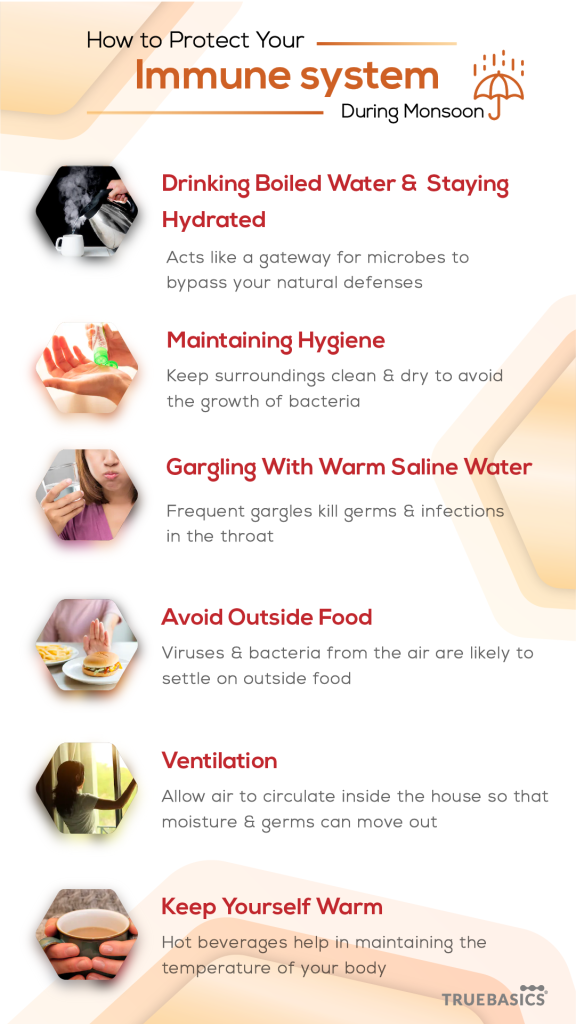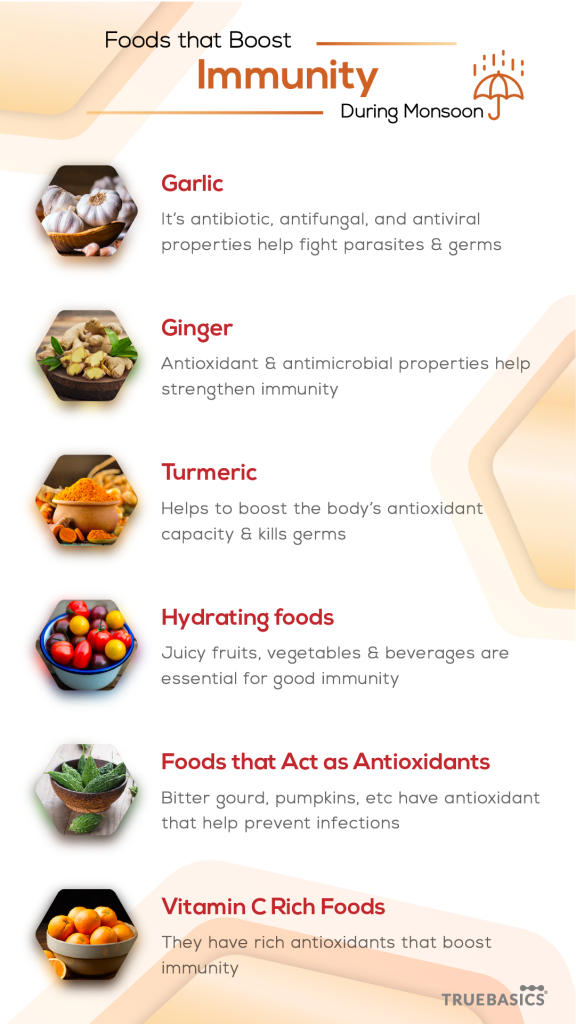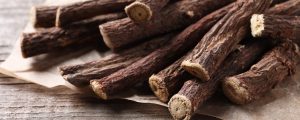It’s not uncommon to fall sick more often when the monsoon season sets in. Not only are you more prone to water-borne diseases like typhoid and diarrhoea, your immune system, a system of natural defense against foreign particles, weakens. You become more susceptible to catching common cold and infections due to a weakened immune system. It is however important to understand that viruses and infections are not dependent on the weather for spreading, except a few that thrive in low temperature or specifically in water. The weather impacts your immunity thus making you more prone to viruses and infections.[1]
Monsoons also bring along with them a breeding ground for mosquitoes, resulting in an increase in diseases like Malaria and Dengue. Your immune system needs to be at its best to fight with all the complications that arise during the rainy season, and hence it is vital to understand how monsoon impacts your immune system and the steps required to keep your immune system in good shape.
How is monsoon a threat to our immunity?
Our immunity goes for a toss during monsoons, the major reason being temperature fluctuations that affect the white blood cells in your blood[2]. White blood cells in your blood flow constantly to fight viruses, bacterias, and other intruders, they are essential to protect you from infections and diseases. When any part of your body is under attack by any foreign particle, distress calls are sent to white blood cells and they destroy the substance.[3]
When you get wet in the rain, your body temperature fluctuates, weakening the white blood cells and lowering your immunity[4]. Pair that with an attack from viruses and infections from everywhere during the rain. Thus, it is essential to focus on building and maintaining your immunity during monsoons, to avoid getting sick.
What are the preventative measures that can be taken?
Precaution is better than cure. It’s safe to put in your best efforts to prevent yourself from falling sick during the rainy season, when your immune system is as it is running slightly low. A few ways are –
Drinking boiled water & staying hydrated
When you boil water, the heat kills any viruses and bacteria, harmful to human health, that the water is carrying. Water flowing through our pipes is likely to get contaminated due to heavy rains, and hence drinking boiled water is recommended.[5]
Staying hydrated irrespective of the season is mandatory! Water flushes out toxins from your body along with keeping your body temperature normal. It plays a key role in the flow of white blood cells throughout your body as it is a lymph[6]. Lymph is a fluid in your body that contains white blood cells.
Maintaining Hygiene
With an increase in mosquitoes and flies, keeping your house free of water clogging, leakage and broken pipes is important. Broken pipes can also lead to a supply of contaminated water, which is a major health risk.
Keep yourself clean and dry as moisture facilitates the growth of infections. Also, your house should be free of mud and stagnant water.
Gargling with warm saline water
Frequent gargles with a pinch of salt added in lukewarm water kills any germs and infection in your throat.
Avoiding outside food
The source of the water used in the preparation of outside food is unknown, also if the food isn’t covered properly, viruses and various bacteria from the air are likely to settle on it. It’s best to completely avoid or at least reduce the intake of outside food.
Ventilation
Occasionally, open windows and doors of your room for air to circulate and the moisture and germs within the room to move out. If you let the moisture stay, mosquitoes and viruses are likely to grow and thrive on it.
Keep yourself warm
Soups, tea, coffee, and other hot beverages are a good way to maintain your body temperature. The heat also helps in killing viruses and infections. Treat yourself with warm fluids during monsoons to stay healthy.

What is the diet that should be followed during monsoon?
Incorporating immunity boosting foods and foods that can fight viruses and bacterias in your diet for the monsoons is a must. These include –
Garlic
Garlic has antibiotic, antifungal, and antiviral properties that help in fighting parasites and germs[7]. Making garlic a part of your diet is recommended. Since garlic is a major ingredient in Indian kitchens, adding it to your diet shouldn’t be a hassle.
Ginger
Ginger tea and ginger juice with honey are some easy ways of taking this antioxidant, antibiotic, antimicrobial, and anti-inflammatory agent. It helps in strengthening the immune system.[8]
Turmeric
Turmeric not only boosts the body’s antioxidant capacity, it also does an exceptional job of killing germs. It contains curcumin, which has anti-inflammatory, antioxidant, and antibacterial properties. The use of turmeric helps in protecting yourself against infections and should be a part of your diet.[9]
Hydrating foods
Keeping your body hydrated is essential for good immunity. Including celery, soups, warm beverages, fresh fruits, and vegetables in your diet is highly recommended.
Foods that act as antioxidants
Antioxidants help in preventing infections and keep you healthy. Bitter gourd, pumpkins, and neem are good for you during monsoons.[10]
Vitamin C rich foods
Vitamin C, an antioxidant is vital in boosting your immunity. Vitamin C keeps you strong and helps maintain bones, muscles, and blood vessels. It also helps absorbing iron and is used in curing common cold. Some vitamin C rich foods are lemon, oranges, citrus fruits,spinach, and broccoli.[11]
Avoid Seafood
Monsoon is the breeding season for fishes and other sea animals. Having fish eggs within the fish may cause stomach infection and food poisoning. It’s best to avoid fish during the rains.

Conclusion
Fluctuating body temperature, contaminated and dirty water, and an increase in mosquitoes and moisture, are quite a few things that are likely to make you fall sick during monsoons. The fact that your immune system is low during the wet season just adds to your woes.
The best way to protect yourself is to eat healthy and stay in a healthy environment. Take the necessary precautions and shuffle your diet as per the weather to boost your immunity. Don’t let the rains dampen your immune system, you need to take charge!
Sources :
[1] What’s the link between cold weather and common cold? https://www.medicalnewstoday.com/articles/323431
[2] Health related problems during monsoon- https://www.google.com/amp/s/www.yashodahospitals.com/blog/health-related-problems-during-monsoon/amp/
[3] What are white blood cells? https://www.urmc.rochester.edu/encyclopedia/content.aspx?ContentTypeID=160&ContentID=35#:~:text=They%20protect%20you%20against%20illness,invaders%20that%20threaten%20your%20health.
[4] Why do we fall sick in monsoons? https://www.google.com/amp/s/www.toppr.com/bytes/fall-sick-monsoons/amp/
[5] Boil Water Response- Information for the public health professional- https://www.health.ny.gov/environmental/water/drinking/boilwater/response_information_public_health_professional.htm#:~:text=Boiling%20water%20kills%20or%20inactivates,more%20accurately%20characterized%20as%20pasteurization.
[6] Why drinking water is the way to go- https://kidshealth.org/en/kids/water.html
[7] Garlic- An immunity boosting superstar- https://www.webmd.com/food-recipes/features/garlic-immunity-boosting-superstar
[8] Anti-Oxidative and Anti-Inflammatory Effects of Ginger in Health and Physical Activity: Review of Current Evidence- https://www.ncbi.nlm.nih.gov/pmc/articles/PMC3665023/
[9] Why is turmeric a powerful immunity booster- https://www.google.com/amp/s/food.ndtv.com/food-drinks/why-is-turmeric-haldi-a-powerful-immunity-booster-expert-reveals-its-health-benefits-and-ways-to-con-2209559%3famp=1&akamai-rum=off
[10]https://www.google.com/amp/s/food.ndtv.com/food-drinks/9-food-habits-you-need-to-follow-this-monsoon-season-1720861%3famp=1&akamai-rum=off
[11] Vitamin C for common cold- https://www.webmd.com/cold-and-flu/cold-guide/vitamin-c-for-common-cold













